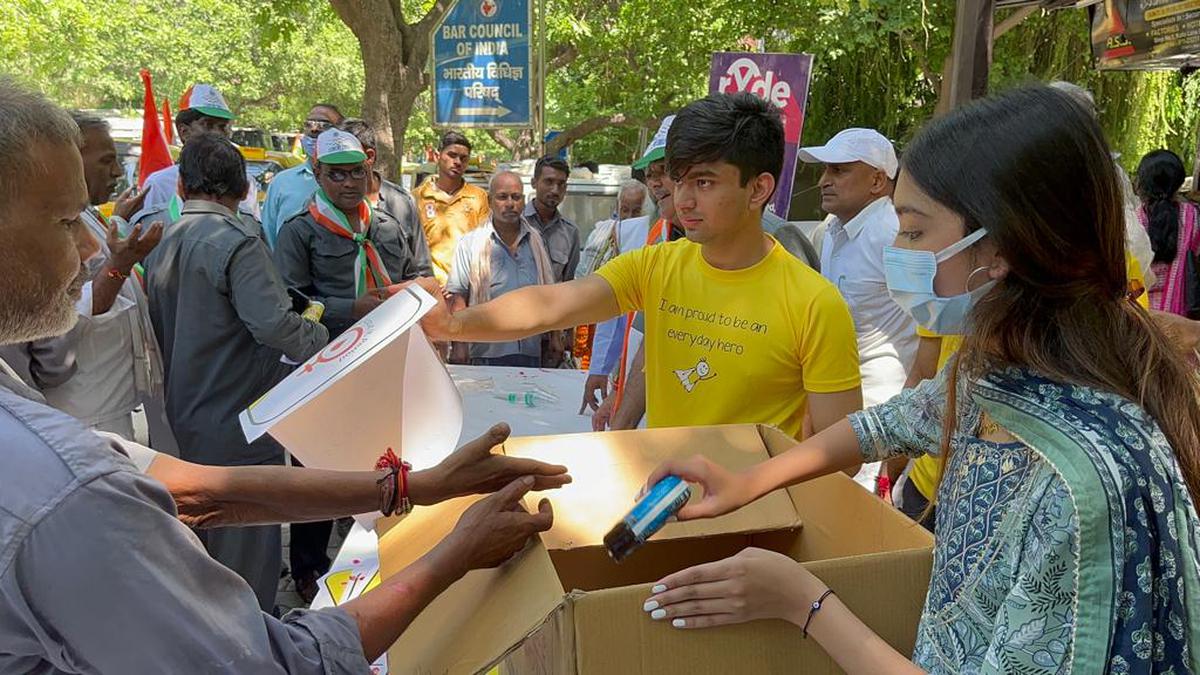Ahana Bharat Ram of Shri Ram School is on a campaign to distribute free sanitary napkins among women who have no means to buy pads.
Ahana Bharat Ram of Shri Ram School is on a campaign to distribute free sanitary napkins among women who have no means to buy pads.
Even as a student of one of Delhi’s top schools, Aahana sneaks into the washroom with her sanitary pads whenever she needs a change during her menstrual cycle. “We are a group of well educated and privileged students but still it is shameful,” she says.
Her own experience made her think about girls from less educated families in remote India. Just before the pandemic kicked off in 2020, in ninth grade, Ahana was doing research for a school project and read an article that suggested only 26% of women in India wore sanitary pads during their periods .
“I was shocked by the statistics and thought that many young girls like us and their mothers might need help,” she says. To examine the realities of how women are treated each month, she and her classmate Anshi Agarwal started an initiative called Spot On and Off and chose one of the most backward districts of Haryana’s Mewat.
Menstrual Health Awareness Workshop for Rural Women | photo credit: special arrangement
He surveyed Kherla, Revsan, Nangli and Sonkh and the stigma and shame surrounding Kaal in the villages was a revelation. When she returned last winter to start a menstrual hygiene workshop, it became a challenge for the girls to start a conversation about menstruation. “We saw the problem; Ahana recounts how the function of a natural body as well as the many more deeply rooted taboos and myths were realized and realized that the power to bring about change rests with women themselves. She remembers several girls who pleaded with her to convince their mothers to use pads. “They said their mothers were too shy to talk about periods or ask for help and didn’t know how to dispose of the pads,” she adds.
While mothers lacked menstrual hygiene awareness, daughters were probably more informed but had less access to menstrual products or no money to buy pads. “Together, they fueled our determination to stop period poverty and period shaming,” says the 16-year-old, now in class XI.
Ahana shouldered the campaign after her friend dropped out. At a parent-teacher meeting in the school, he set up a stall to share his idea and raised ₹30,000. This was followed by more donations that helped him buy reusable cloth pads from Goonj, while a doctor committed to donate a batch of 1,000 disposable pads. Volunteered at their home with two of her school friends and the cook’s daughter, Aahana now conducts periodic workshops to explain to women the process of menstruation and the importance of menstrual hygiene and help them overcome all fears, doubts and Helps to get rid of stigma. It has also tied up with NGOs to further its mission.

Distribution of menstrual health awareness posters and sanitary pads among Delhi auto drivers. photo credit: special arrangement
On this Independence Day, he launched CRY’s pan-India campaign ‘Let’s talk about it! Duration!’ and Delhi Auto Rickshaw Union to remove taboos and normalize periods. Over 1,000 auto drivers pledged to raise awareness against period shaming. They were given packs of reusable sanitary pads for needy travelers and posters on menstrual health and hygiene to display on their vehicles for the next three months.
Delhi auto rickshaw drivers participate in menstrual health awareness campaign. photo credit: special arrangement
With Delhi Police playing a vital role in spreading awareness and extending her support for Auto Wale, Aahana now also dreams of taking the help of Delhi Government to teach about menstruation in her schools and meeting with officials has demanded.
“It aims to bring about a change and remove the culture of stigma and silence about menstruation,” says Ahana, who has sold 6,500 reusable cloth bags in Rajasthan, Bengaluru, Madhya Pradesh, Bihar, Haryana and Delhi in the past six months. Pads have been distributed. “We are trying to collect feedback every three months. Packs of eight reusable cloth pads should last them up to a year; Until then women should be self-motivated to continue safe menstrual health practices on their own,” she says, adding that “it’s still a huge task.”